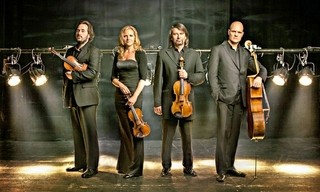|
Back
Dancing, both Pedular and Galactic New York
Zankel Hall, Carnegie Hall
04/15/2015 -
Antonin Dvorák: String Quartet No. 12 in F Major (“American”), Opus 96
Pēteris Vasks: String Quartet No. 2
Bederich Smetana: String Quartet No. 1 in E Minor (“From My Life”)
Artemis Quartet: Vineta Sareika, Gregor Sigl (Violins), Friedemann Weigle (Viola), Eckart Runge (Cello)

G. Sigl, V. Sareika, E. Runge, F. Weigle (© Courtesy of the Artists)
These three days are agony for us self-styled cognoscenti.
Who on earth would give up listening to a trio of concerts by the Boston Symphony Orchestra conducted by the great Andris Nelsons? I did. Last night, like Tina Turner, I didn’t need another Hero’s Life. Tonight, while hating the sacrifice of violinist Christian Tetzlaff, Jordi Savall beckons with rare 17th Century music. Tomorrow, yes, a seat will be taken for the BSO doing Mahler’s Sixth. Not that the Boston Symphony needs me…but maybe I need it.
Though I felt no guilt whatsoever last night with the Artemis Quartet. As Friedemann Weigle started the Dvořák “American” String Quartet with such vitality, it became evident that this violist was the harbinger of terrific two-thirds Bohemian evening. Music written the same era as the Strauss Heldenleben, but less earnestly, more jovially, and here played with all the ethnic exuberance it deserved.
The transnational Artemis Quartet (one Latvian, two Germans, one Belgian, all based in Berlin) may be famed for its Beethoven quartet cycle on record, but their other repertory is as varied as the quartet’s origins. And with this Dvořák, and the Smetana Quaret, one realizes that Central European music might be their forte (as well as their pianissimos).
Both these works were bright, luminous, played with a stamping joy. Dvořák’s shortest quartet was inspired by (what Dvořák considered) the simplicity of Josef Haydn, as well as a birdcall, in this case the Scarlet Tanager, which he had heard when in Iowa.
I hadn’t been aware of either factoid until reading the excellent program notes by Harry Haskell. But was certainly familiar with this quartet. The Artemis played it with a transparency, even a bounce through three of the four movements. They took the Lento second movement probably at the right pace, but it was played with such intensity by First Violin Vineta Sareika that it seemed to fly by. In fact, the Artemis let no syncopation, not a single cheery tune go by without more and more energy.
Nor was anything held back in the Smetana Quartet, more pictorial than Dvořák’s. And thereby lay the rub.
From the very first jarring sforzando, again by violist Mr. Weigle, the Artemis made certain we were aware that the composer considered himself quite the dandy dancer when a youth, writing polkas for his own pleasure the way Schubert wrote waltzes. Some are mundane, but all are danceable. And the way the Artemis played their third polka movement, one could imagine Smetana’s 1878 audiences rising from their seats to do some swayin’ and struttin’. Except that these were not ordinary polkas, and Smetana made them so asymmetrical that the original quartet for whom he composed it refused to play the piece.
Smetana shrugged it off. He had more pressing problems. Dvořák himself took over the duties of the viola-player in a private-house performance, and he had no difficulties. Nor did the Artemis Quartet, who turned this into a gleeful work.
The rub, of course, was in the final movement. Smetana’s tinnitus, a nightmare of increasing deafness, turned the finale into one of tragic last measures. Beethoven fought his deafness, the contemporary composer Neil Rolnick has used his increasing affliction as an original way to hear the world. Smetana let his problems all hang out. And the sudden tragedy, after such an exuberant opening, was literally disconcerting.
The Carnegie Hall premiere last night, written a decade ago, was by Pēteris Vasks, who, like nearly all Latvian composers, has more than a mystical tinge. Until this Fifth Quartet, I had only heard his glowing choral-organ work Dona Nobis Pacem. That , as well as parts of the second movement of the quartet, entitled so distant…yet near, was indistinguishable from his colleague Arvo Pärt. Yet this is less a detriment than an asset to a piece which breathes both torment and consolation.
The first movement began with a quasi-Bach quote for the first measures, then went into its own dual role with both muscular dissonances and noble diatonic chords, all this under the name, being present. That second movement was both funereal and emotionally moving, and the Artemis Quartet played it with the same fierce dedication, its let-it-all-hang-out spirit as the other performances last night, finishing with a widely-spaced C minor chord which dangled in the air, its wavering notes like hazy signs from the galactic beyond...
Harry Rolnick
|